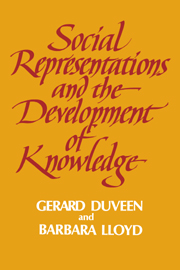Book contents
- Frontmatter
- Contents
- List of figures
- List of tables
- List of contributors
- Acknowledgements
- 1 Introduction
- 2 The underlife of the nursery school: young children's social representations of adult rules
- 3 A semiotic analysis of the development of social representations of gender
- 4 Children's representations of social relations
- 5 Social representations of childhood: an implicit theory of development
- 6 What is in an image? The structure of mothers' images of the child and their influence on conversational styles
- 7 The acquisition of reflexive social emotions: the transmission and reproduction of social control through joint action
- 8 From social cognition to social representations in the study of intelligence
- 9 Prototypes of the psychologist and professionalisation: diverging social representations of a developmental process
- 10 Social psychology and developmental psychology: extending the conversation
- Author index
- Subject index
9 - Prototypes of the psychologist and professionalisation: diverging social representations of a developmental process
Published online by Cambridge University Press: 08 March 2010
- Frontmatter
- Contents
- List of figures
- List of tables
- List of contributors
- Acknowledgements
- 1 Introduction
- 2 The underlife of the nursery school: young children's social representations of adult rules
- 3 A semiotic analysis of the development of social representations of gender
- 4 Children's representations of social relations
- 5 Social representations of childhood: an implicit theory of development
- 6 What is in an image? The structure of mothers' images of the child and their influence on conversational styles
- 7 The acquisition of reflexive social emotions: the transmission and reproduction of social control through joint action
- 8 From social cognition to social representations in the study of intelligence
- 9 Prototypes of the psychologist and professionalisation: diverging social representations of a developmental process
- 10 Social psychology and developmental psychology: extending the conversation
- Author index
- Subject index
Summary
Anchoring and prototypes
Social representations are construed as ways of knowing and organising reality; they provide the social psychological instruments for the construction of objects of knowledge, and in this sense they are at the core of any process of developing knowledge. The locus of social representations is social groups, and they play an essential role in developing as well as in maintaining intergroup relations. It is probably for this reason that anchoring, the mechanism which has been most widely studied in empirical surveys of social representations, has been interpreted mainly in terms of how objects become rooted in a group's system of values. While this interpretation is certainly true, this chapter also draws on other meanings of the term in presenting a study in the field of group values. The aspect of anchoring which has been considered less often concerns the socio-cognitive process of comparisons between categories in order to locate the familiar category which offers the best fit for something ‘new’ as a social representation is constructed about a novel object.
What I have tried to analyse in this study of social representations of the professionalisation of psychology are precisely these socio-cognitive procedures of categorisation through which anchoring takes place. These procedures result in different ways of knowing as different social groups evaluate and elaborate the same object in different ways. The point at which a particular group anchors an object in its conceptual field is influenced by the dynamic of its relations with other groups.
- Type
- Chapter
- Information
- Social Representations and the Development of Knowledge , pp. 144 - 163Publisher: Cambridge University PressPrint publication year: 1990
- 7
- Cited by

